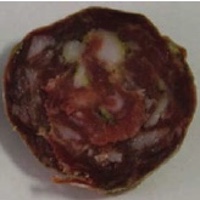Effects of vegetable powders as nitrite alternative in Italian dry fermented sausage

Accepted: 27 November 2019
HTML: 55
All claims expressed in this article are solely those of the authors and do not necessarily represent those of their affiliated organizations, or those of the publisher, the editors and the reviewers. Any product that may be evaluated in this article or claim that may be made by its manufacturer is not guaranteed or endorsed by the publisher.
Authors
The aim of this work was to study the effects of reformulation of an Italian dry fermented sausage by replacing nitrite with celery or spinach powder alone or in combination with beet powder on some quality characteristics of the product. Five different sausage formulations were produced: i) Control negative (CN): no nitrate added; ii) Control positive (CP) 150 mg/kg potassium nitrate; Group with celery powder (GSe): 3 g/kg celery powder; iii) Group with celery powder and beet powder (GSeB): 3 g/kg of celery and beet powder, respectively; iv) Group with spinach powder and beet powder (GSpB): 3 g/kg of spinach and beet powder, respectively. There was no significant difference between the residual nitrite contents of the samples at the end of the storage period. From microbiological analysis no target pathogenic bacterium has been isolated and the lactic bacteria microflora showed a similar trend in all of the lots. Suggested storage periods for CP, GSe and GSeB were over 60 days by taking into consideration the microbiology and sensory evaluation. Sensory evaluation scores of samples with celery powder, in fact, were comparable to those of CP during storage. The GSpB samples showed similar and higher values regarding the structural attributes, the related attribute to colour showed decidedly lower values due to a greenish coloration of the slice to the presence of spinach.
How to Cite
PAGEPress has chosen to apply the Creative Commons Attribution NonCommercial 4.0 International License (CC BY-NC 4.0) to all manuscripts to be published.

 https://doi.org/10.4081/ijfs.2020.8422
https://doi.org/10.4081/ijfs.2020.8422



